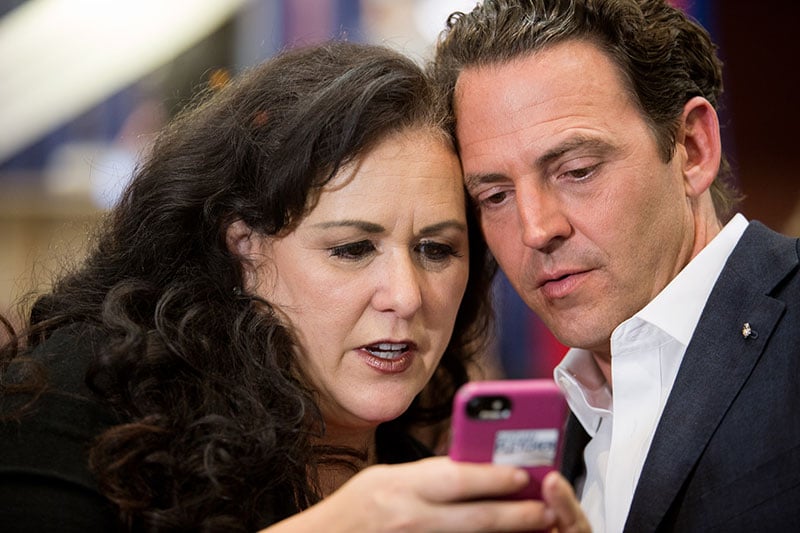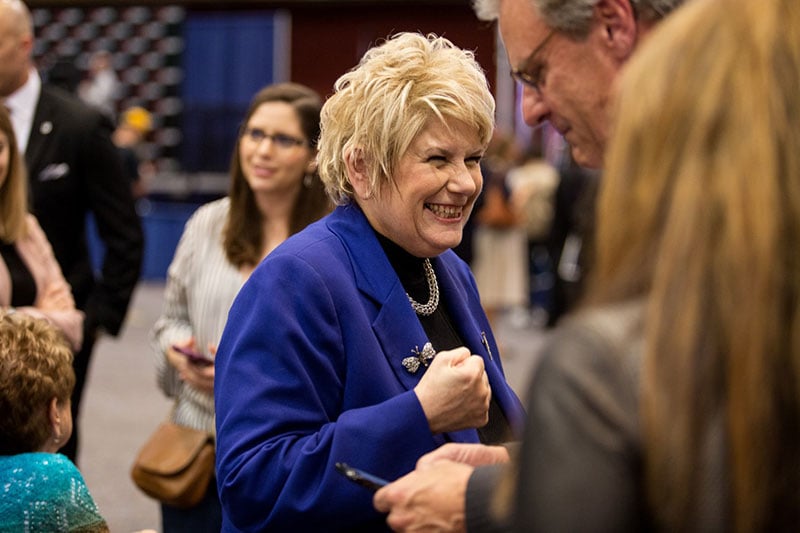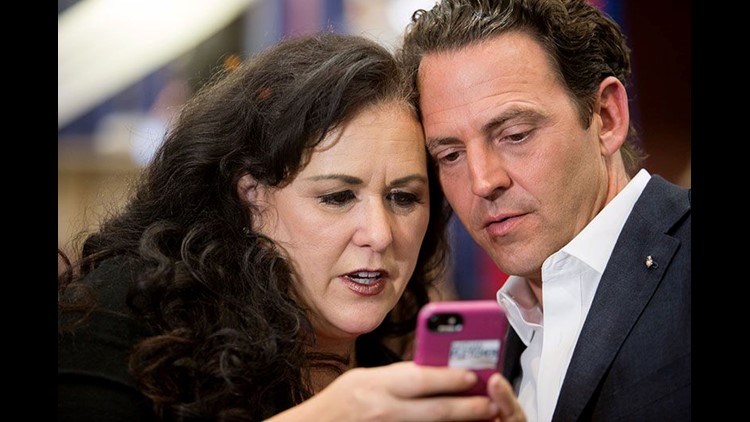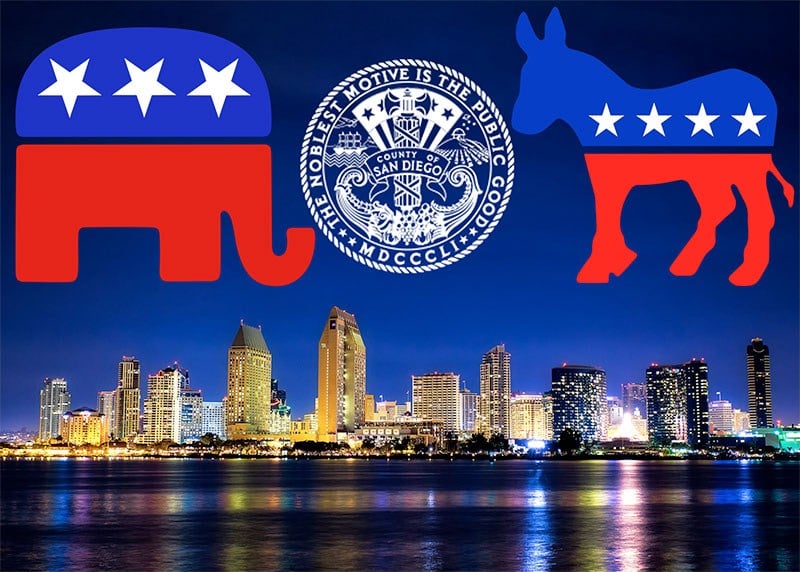
San Diego County Board of Supervisors candidate Nathan Fletcher and his wife, Democratic Assemblywoman Lorena Gonzalez Fletcher, follow the primary election results on June 5, 2018. (Megan Wood/inewsource)
By Jill Castellano | inewsource
It's not a normal year in San Diego politics.
The San Diego County Democratic Party spent $958,000 supporting Board of Supervisors candidate Nathan Fletcher leading up to the June primary.
That's more money than the county Republican and Democratic parties have spent on any other candidate this decade, according to an inewsource analysis.
It's also 37 times the maximum amount of money that political parties are allowed to give county supervisor candidates: $25,950.
So how did Fletcher get nearly $1 million in support from the local Democratic Party - and he'll get more for his November runoff with Republican Bonnie Dumanis - when the contribution limit is so much smaller than that?
The Democrats used a part of California's campaign finance law called "member communications." Republicans use it all the time, too. It's existed for decades and has allowed both parties to funnel hundreds of thousands of dollars into San Diego races despite efforts by local governments to curb party spending.
Rather than contributing directly to candidates' campaigns, California's political parties can spend unlimited amounts of money telling people who they should vote for, so long as they're only communicating with members of their own party. They can even coordinate and strategize with the candidates on what exactly to do with the funds.
This type of spending is especially difficult to track. To gather data on member communications in San Diego County, inewsource compiled more than 3,400 transactions by hand that were listed on more than 120 financial reports the local parties have filed with the Secretary of State's Office since 2011.
This election cycle, San Diego's parties have spent about $1.3 million on member communications in all kinds of races, including races for the state Assembly, district attorney, San Diego City Council, Chula Vista mayor and boards of education.
But the race to replace Republican Supervisor Ron Roberts - who is termed out after more than two decades in office - has attracted the most cash from the political parties.
Click here to see how much money political parties have spent on local candidates since 2011. (Photo by Michael Matti, via Flickr)
That's in part because Fletcher is the best chance for Democrats to get a seat on the all-Republican Board of Supervisors. It also helps that Fletcher, a former assemblyman who left the Republican Party to be an independent before becoming a Democrat, is married to a prominent Democrat.
Assemblywoman Lorena Gonzalez Fletcher has given the San Diego County Democratic Party $370,000 since the start of last year through her campaign committees, three times more than anyone else has contributed to either party this election cycle.
That's not typical for Gonzalez Fletcher. In each of the previous two election cycles, she gave the party about $16,000.
Under state law, parties can accept as much money as they want from elected officials as long as they don't explicitly say how the money should be spent.
What the assemblywoman is doing to help the Democratic Party and her husband is legal. But Bob Stern, co-author of California's Political Reform Act in 1974, said what has happened in Fletcher's race is noteworthy.
"Clearly they're taking advantage of all the loopholes they can," Stern said.
What's unusual, he said, is having "a wife that is also a legislator that is so involved in giving the money."
Gonzalez Fletcher said there are no loopholes.
"I think when the law was written, it was clear that there could be money going into the party, and the party could use unlimited amounts of money to speak to their own members," she said. "That's the law."
Democrats see 'historic opportunity'
The Board of Supervisors is a panel of five Republicans that runs America's fifth most populous county. Four of the supervisors have been serving since the 1990s.
During that time, the once mostly red county has transformed into a mostly blue one. This is especially true in the 4th Supervisorial District, which covers central San Diego. There are now two registered Democrats for every Republican in the district.
With term limits in place for the Board of Supervisors, the 2018 election marks the first time Roberts' seat has been open in a generation. Democrats are fighting for a voice on the board, while Republicans don't want to lose even one spot.
Five candidates - four Democrats and one Republican - vied in the June primary for Roberts' seat. Fletcher finished first with 29.2 percent of the vote, and former District Attorney Dumanis came in second with 26.1 percent.
Jessica Hayes, chair of the county Democratic Party, defended the spending to win Roberts' seat. In an email, she said:
"This election cycle is an historic opportunity for Democrats to pick up a seat on the County Board of Supervisors, an entity that impacts all citizens of San Diego County on a daily basis, from fair wages to transportation and housing, from healthcare to water and fire protection. … Our spending reflects the fact that this race is a high priority, and the results speak for themselves."
Leading up to the primary, political action committees spent an unprecedented $1.2 million in the race. The five candidates spent another $1.4 million in campaign money.
But the political parties' involvement has been less clear because of how difficult it is to follow their spending. An inewsource analysis found the Democratic Party spent $6 per registered Democrat in the district to support Fletcher. Almost half of the money paid for fliers mailed to Democrats, and the rest went mostly to online ads and phone calls.
Fletcher's campaign was legally allowed to work with the Democratic Party on how it should spend the almost $1 million in member communications.
Fletcher said the party money helped combat negative ads paid for by the Republican-leaning Lincoln Club and San Diego Regional Chamber of Commerce, which used PACs to spend at least $446,000 opposing him. Other groups spent $207,000 propping up another Democrat in the race, Lori Saldaña, who finished third in the primary.
"We were a little shocked that we came in first given the volume of spending against us," Fletcher said, "and I think it prepares us well to run a very aggressive general election campaign."
The Republican Party has so far spent $167,000 supporting Dumanis - six times the party contribution limit - and it was almost entirely through member communications. That's $2 per registered Republican in the district.

San Diego County Board of Supervisors candidate Bonnie Dumanis celebrates her second-place primary finish on June 5, 2018. She faces first-place finisher Nathan Fletcher in the November runoff election. (Megan Wood/inewsource)
Dumanis said the Democrats spent more than the Republicans partly because of Gonzalez Fletcher's involvement.
"It doesn't surprise me for Nathan, since his wife is chair of the (Assembly) Appropriations Committee and is doing the raising of the money for him really," Dumanis said. "So she has unlimited money in her coffers as she runs for Assembly. She can take that money and then put it directly into the party."
Gonzalez Fletcher has made nine donations to the Democratic Party since the start of last year. On May 23, the exact amount she donated to the party - $50,000 - was spent by the party on a member communication for online ads to support her husband.
Fletcher declined to talk about his wife's contributions to the party, saying she's a "strong, bold, dynamic woman who doesn't need her husband to speak for her."
Gonzalez Fletcher has been involved in San Diego politics since she ran in a special election for City Council in 2005 and lost by 724 votes to Republican Kevin Faulconer, who's now the mayor. In her role as CEO of the San Diego-Imperial Counties Labor Council, she also helped promote the ballot measure that put term limits on the county supervisors.
Even before the county Democratic Party endorsed her husband last year, Gonzalez Fletcher said she planned to get involved in the supervisor race.
"You take a situation that I'm supportive of anyway and make it more personal, and I said, yeah, we're going to do what we can to ensure that we have a strong Democrat there," she said.
Parties get around spending limits
San Diego County's elected leaders have tried and failed to control political party spending for years.
In 2011, the Board of Supervisors capped the amount parties could donate to county candidates at $1,000, the same limit the city of San Diego had in place for City Council and mayoral races. Then, in January 2012, a federal judge ruled the city's law restricted free speech. That prompted the supervisors to scrap the county's contribution limit.
Throughout the next year, when there were no limits on party spending, the Republican Party spent more money on a single candidate than it has at any other time this decade. It was to fund Carl DeMaio's bid for San Diego mayor.
The party contributed $404,000 to his campaign and spent another $480,000 through member communications on fliers, robocalls, door hangers, polling and more.
But after the city and county set new contribution limits, the parties continued to rely on member communications to spend hundreds of thousands of dollars in local races. State law prevents local governments from limiting member communications because they're considered free speech.
San Diego's new contribution limits went into effect three weeks before San Diego Mayor Bob Filner resigned amid sexual harassment allegations in 2013. Parties could now donate no more than $20,000 to a mayoral candidate and $10,000 to City Council candidates.
Filner was the city's first Democratic mayor in 20 years, and Republicans were ready to take the seat back. The contribution limit didn't stop them.
The party spent $633,000 supporting Faulconer in the special mayoral election, using about a third of it in the primary on phone calls and fliers and the rest in the general, largely on canvassers to knock on voters' doors in the days before the election.
The Democratic Party spent $466,000 supporting Faulconer's opponent, Councilman David Alvarez.
Campaign finance experts have voiced concern over these unlimited spending practices. Stern said if voters "care about money in politics, if they believe that the money should be raised in smaller amounts, and should not be spent in unlimited amounts, then they (should) care" about member communications.
Tony Krvaric, chairman of the county Republican Party, defended member communications as a fair way to tell voters about candidates, especially in nonpartisan races such as supervisor when voters won't see which candidates belong to which party on the ballot.
"If you belong to, you know, whatever, a chess club with 200 people, you guys can communicate amongst each other as much as you want," Krvaric said. "Nobody would ever think to say no, you guys can only talk to your fellow members so often or so much."
The county Republican Party has advocated for no limits on party spending of any kind, arguing that strong political parties are a better source of funding in local elections than special-interest groups that might use PACs to obscure their identities and mislead voters.
That position is so important to the Republican Party that after the county passed its limits in 2015, party officials tried to oust Republican Supervisor Dianne Jacob - who voted in favor of the limits - by funding potential challenger state Sen. Joel Anderson. He eventually dropped out of the race, and Jacob easily won re-election to a seventh and final term.
For now, Republicans and Democrats can agree on one thing: The real prize is still ahead of them. It's the open 4th District seat on the county Board of Supervisors.
This month, the Democratic Party contributed $25,000 to Fletcher's campaign for the fall.
"We wholly expect and anticipate that millions of dollars will be spent against us once more," Fletcher said, "and we will be prepared to respond."
********
********
inewsource is an independent, investigative journalism nonprofit supported by foundations, philanthropists and viewers like you.
********
Read additional stories on the inewsource.org website.




